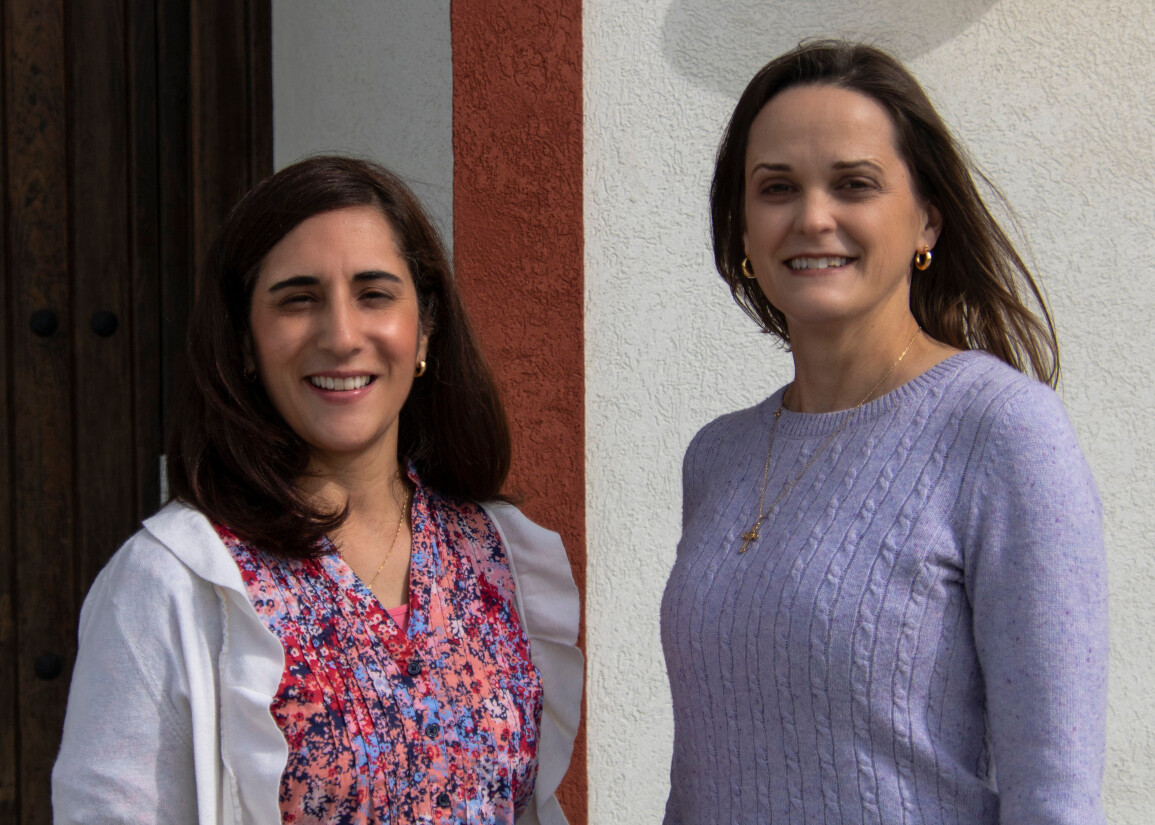Diocesan program helps Hispanic women have ‘more of a voice’ in community
Camila Valencia and Meg Campos of Catholic Charities of the Diocese of Lexington, Ky., stand in front of the Centro de San Juan Diego in this undated photo. The community center, which is a new apostolate of the diocese, has an initiative to accompany women in the Hispanic community. (CNS photo/courtesy Deacon Skip Olson via Cross Roads)
LEXINGTON, Ky. (CNS) — On a clear spring afternoon, Lexington’s Cardinal Valley neighborhood is buzzing with activity.
Birdsong mingles with the bass beat of a passing car stereo, while people move between homes, hair salons, taquerias and panaderías.
In the midst of all this life, the bright stucco facade of Centro de San Juan Diego rises up. It is reminiscent of centuries-old Spanish missions, but brimming with a new hope and energy that all who enter its doors quickly feel for themselves.
“I really believe it is a work of God,” said Camila Valencia, the new bilingual program coordinator for Catholic Charities of the Diocese of Lexington. “You feel safe and welcome.”
A recent grant awarded to Catholic Charities by Our Sunday Visitor Institute is bringing specific focus to an outreach to women in the Hispanic and Latino community in Lexington.
“Our goal is to empower women to have more of a voice in their communities, their children’s schools, and when advocating for their families,” explained Meg Campos, Catholic Charities director. “Many of these women are raising their children in a community or society that’s different from the one in which they were raised.”
Valencia and Campos provide this outreach through Centro de San Juan Diego, a new apostolate of the Lexington Diocese spearheaded by Deacon Jim and Dot Bennett, and operated with the support of Catholic Charities and a rapidly growing number of volunteers.
Located within walking distance of 10,000 Spanish-speaking members of the Lexington community, it serves as a place where anyone — regardless of language, background, status or skill set — can find a place to belong.
“There are additional challenges for immigrants because of language barriers, cultural customs, fears and prejudices, and other differences. The center is a place people can go that is trustworthy,” said Mary Ortwein, a mental health counselor who volunteers her time.
It’s “a welcoming place with lots of knowledgeable helpers who understand the many challenges,” she added.
Those helpers include Valencia. Since beginning her work with Catholic Charities in March, she has wasted no time in building a network of resources for women in the community.
As a participant of V Encuentro and one of the first volunteers of the “promotora de salud,” or community health worker, program, Valencia knows the importance of being able to quickly connect people with the resources they need to achieve their personal and family goals.
And as a parishioner at Mary Queen of the Holy Rosary Parish in Lexington, Valencia has experienced for herself the healing and transformative power of a compassionate faith community.
“Mary Queen has been a really important part of my journey,” Valencia told Cross Roads, Lexington’s diocesan magazine. “From the school, to support from the priests and the friendships I’ve developed, to my role in faith formation — they’ve helped me get to where I am.”
A native of Colombia and a single mother of three, Valencia has not only navigated life as an immigrant to the United States for herself, but has already used the wealth of information she has gathered to serve others.
“From my own experience, it is possible to use English and Spanish programs to serve the community,” Valencia said. “I will be a bridge and offer referrals to women as I learn about their needs.”
One of Valencia’s goals is to develop a robust index of community partners that can address every aspect of what “empowerment” can look like — including physical health and preventative care, social and emotional wellness, faith formation and children’s activities, finance and education, and maintaining healthy relationships and peaceful families.
From her background in health care Valencia knows the importance of an integrated approach to wellness. “A person has to have housing, health care and social services,” Valencia explained. “That leads to good health, employment and stable support.”
Despite restrictions and challenges presented by the pandemic during the early months of the center’s operations, 42 different services are currently being offered there, or will be offered soon.
Valencia recalled a recent memory of an after-school faith formation program run by the Missionary Daughters of the Rosary of Our Lady of Fatima. Besides being attentive to the children, the sisters also meet with many of their mothers and other women in the area, providing space for conversation and friendships to grow.
As Valencia develops Catholic Charities’ new Mujeres Fuertes program, these relationships will inform many resources that can support and empower women in the community.
“When you start a group, you’re really in that listening mode,” said Campos, “so you hear the needs, which causes you to explore other initiatives that meet needs. It’s a listening and collaborative effort, and it has to be grassroots.”
For all of the new things happening at Centro de San Juan Diego, perhaps it is the place itself that has the most immediate impact on the people who have experienced it.
“The greatest impact comes from the ambiance of the Centro — the warmth, the friendliness, the newness and beauty of the place,” said Ortwein. “This is a community home with helpers who help with their smiles and attention, as well as any professional skills.”
McCormack-Finley writes for Cross Roads, the magazine of the Diocese of Lexington.



